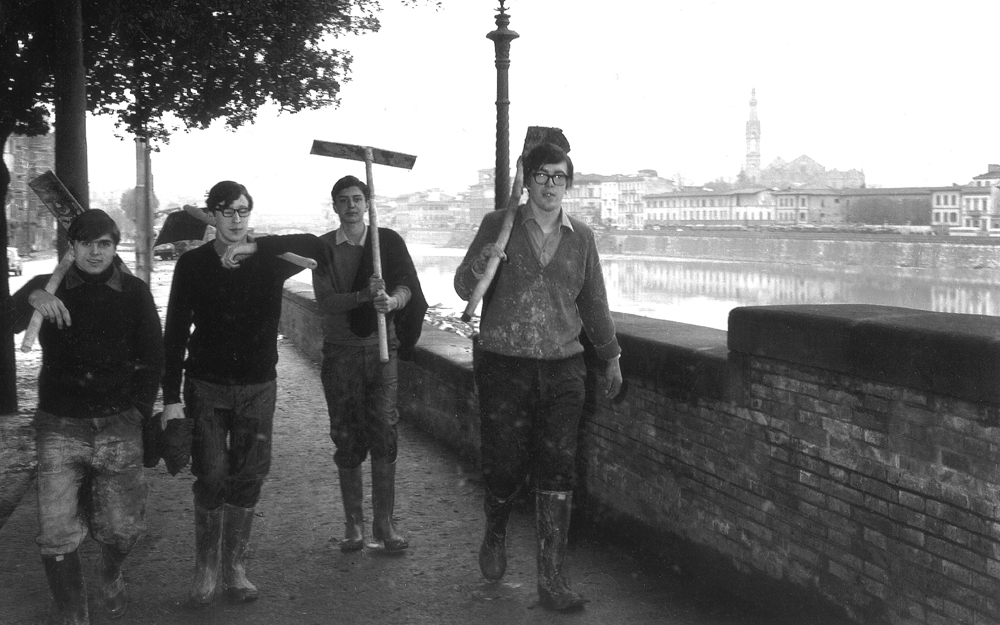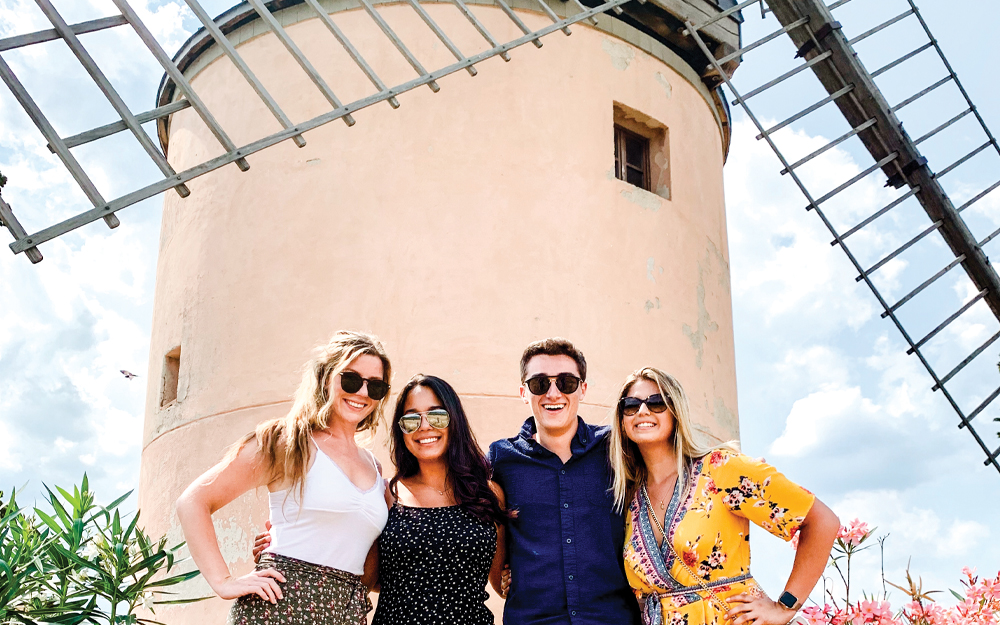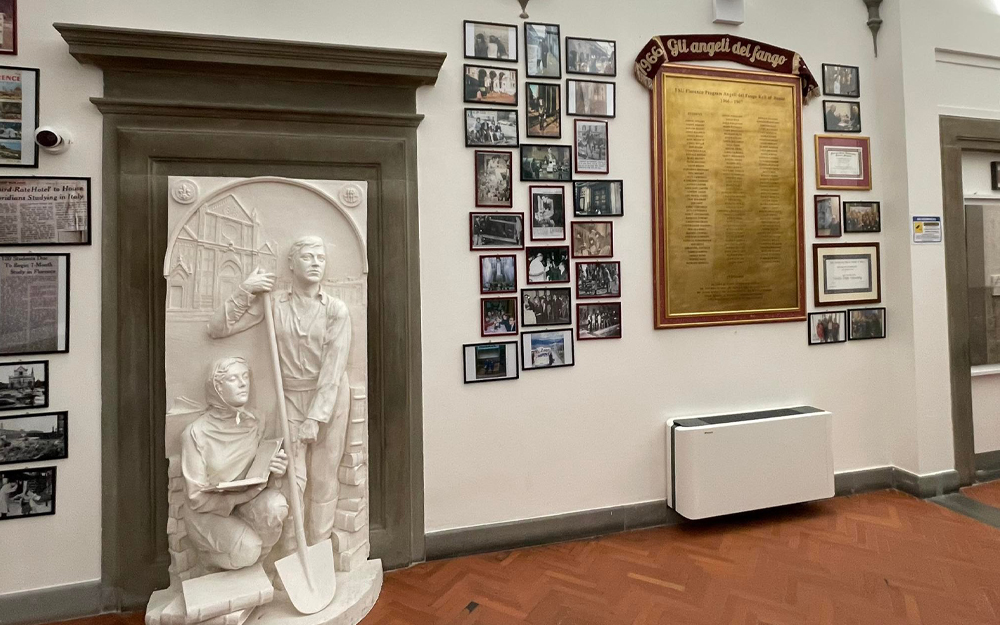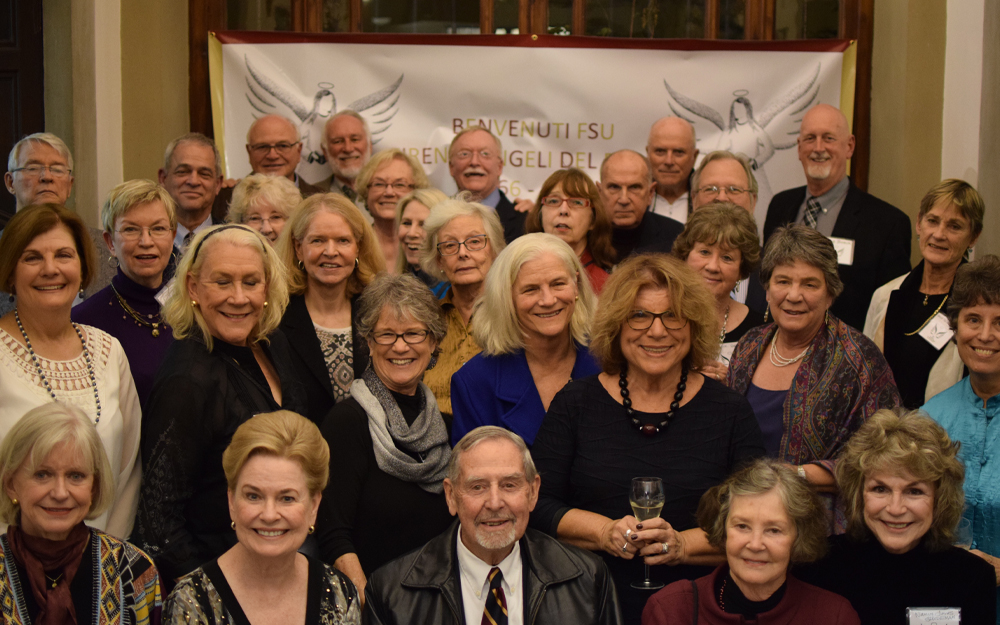THE RICH HISTORY OF THE FSU FLORENCE PROGRAM
The FSU Florence Program Study Center’s vision took shape in the summer of 1964 when the Florida State University’s “Flying High” Circus embarked on a tour of Europe with scheduled stops in Greece, Spain, France, and Italy. The circus’s performers, all students, were accompanied by the Dean of Student Affairs Dr. Roscoe “Ross” Oglesby and literature professor Dr. Eugene V. Tanzy. University and Italian officials arranged three performances for the troupe in Italy outside of Florence in the ancient Roman theater nestled between the green hills of Fiesole.
As the students prepared the circus stage for the first night’s performance, Oglesby and Tanzy took a seat in the theater and looked out upon the hills dotted with cypress trees and olive groves. Tanzy, a scholar of British literature and expert in the poetry of Elizabeth Barrett Browning and Robert Browning began to cite a passage in the latter’s poem “Andrea del Sarto,” calling out among the ancient stones “to yonder sober pleasant Fiesole.”
Several students recalled that it was here, and during the subsequent nights’ performances, that the vision for an FSU Florence Program first took shape. Upon their return to Tallahassee, Oglesby and Tanzy presented their ideas to FSU President John E. Champion who formulated a proposal for submission to the Florida Board of Regents. On December 17th, 1965 the Board approved a one-time, FSU-administered pilot program in Florence open to students enrolled throughout the State University System for a seven-month period beginning September 1st, 1966 and concluding March 31st, 1967.
President Champion appointed a steering committee from seven different academic departments, which after negotiations with several hotels in Florence, chose the Albergo Capri in Via XXVII Aprile as the university’s first study center. The committee established 120 as the maximum enrollment, which they calculated from the number of students the hotel’s dining room could contain during meals. Tuition and room and board was set at $1,044 for the entire length of the program. In late August 1966, 120 students accompanied by Program Director Tanzy and six faculty members, departed the USA on an Alitalia flight from New York City to Pisa.
WHO ARE THE MUD ANGELS?
Two months later tragedy struck in the form of Mother Nature. On November 4th, 1966 the Arno River violently and unexpectedly flooded its banks, wreaking havoc and destruction in Florence. A wall of water, which at its zenith reached 22-feet in height in some parts of the city, left 600,000 tons of mud, sewage and debris in its wake. The damage was incalculable to the city’s museums, archives, libraries, and private residences and businesses.
An estimated four million books and manuscripts and 14,000 works of art lay submerged in the mud and petroleum. Water and heating lines were cut. Instead of disbanding the program and abandoning Florence, FSU students and their professors responded to the citywide call for volunteers. They triaged books in the National Library; lifted damaged works of art from the debris, carrying them from the museums to the conservators’ studios; they assisted Florentines with the clearing of the detritus from their shops and homes; and they “would not quit the dirty work” until they were ordered to do so by Dr. Tanzy.
Each evening they returned to their rooms and slept in their beds covered with mud and oil; they waited on line to receive fresh water and food issued by military units; and they brushed their teeth with Coca-Cola and wine. When Florentines saw the FSU students and other young volunteers from all over the world returning from their work, they would call them Gli angeli del fango, The Mud Angels, who received international recognition for their efforts.
PERMANENT ESTABLISHMENT OF THE FLORENCE PROGRAM
In Rome for a little rest and recovery, the program’s students were received by Italian officials and issued official proclamations of gratitude, culminating with an audience before Pope Paul VI in Vatican City. Amid the devastation, FSU’s Mud Angels took a vote to decide if they should continue on in Florence or return home. The vote was 120-0, thus confirming the students’ commitment to seeing the first year of the Florence Program to its successful conclusion. In Florida, the Board of Regents approved the permanent establishment of the Florida State University Florence Study Center.
HONORING THE MUD ANGELS
The Mud Angels paved the way for the permanent establishment of the Florence Program. Your gift to support the Mud Angels Fund will honor their contributions to the programs' continued success and allow many more students to participate in a life-changing experience at the Florence Study Center. The generous leadership gift from Mud Angel alumna, Diane Van Oeveren and her husband, Ron Van Oeveren allowed us with the opportunity to establish the Mud Angels Fund. Their support is a testament to their commitment to student success and with your additional donation, more students will have the opportunity to experience the rich tradition of the Florence program!



